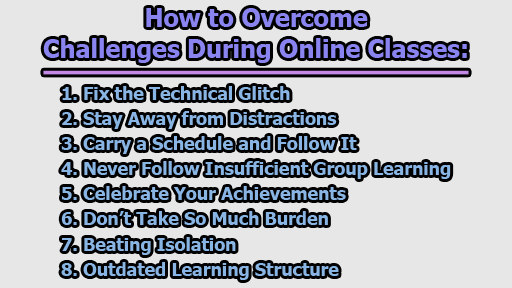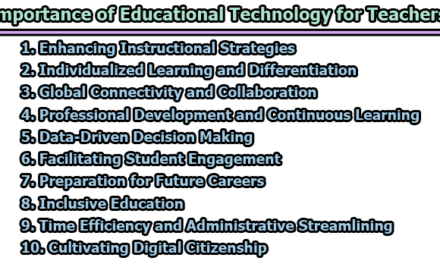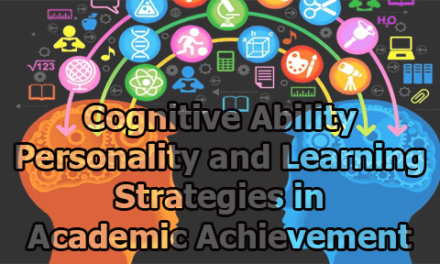How to Overcome Challenges During Online Classes:
The landscape of education has undergone a significant transformation with the widespread adoption of online classes. While the digital realm offers flexibility and convenience, it also presents unique challenges for students. In this article, we will explore how to overcome challenges during online classes.
Challenges During Online Classes:
1. Technical Problems: Online classes heavily rely on technology, making technical problems a common hurdle. Internet connectivity issues, hardware malfunctions, and software glitches can disrupt the learning experience. To overcome technical problems:
- Regularly Check and Update Technology: Ensure your internet connection is stable, update software, and maintain the health of your devices.
- Familiarize Yourself with Troubleshooting: Learn basic troubleshooting techniques to address minor technical glitches promptly.
- Have Backup Plans: Always have alternative devices or a backup internet connection in case of unexpected technical failures.
2. Lack of Discipline and Distractions: The home setting, while comfortable, can be rife with distractions that hinder concentration. Maintaining discipline in the absence of a traditional classroom environment poses a considerable challenge. To overcome lack of discipline and distractions:
- Create a Dedicated Study Space: Designate a quiet, clutter-free space specifically for studying to minimize potential disturbances.
- Set Specific Study Hours: Establish and adhere to a consistent schedule with dedicated study hours to cultivate discipline.
- Utilize Distraction-Blocking Tools: Leverage website blockers and apps to limit access to social media and other distractions during study sessions.
3. Schedule Problems: While online learning offers flexibility, it can lead to irregular schedules. Poor time management may result in missed deadlines and a lack of academic progress. To overcome schedule problems:
- Develop a Detailed Schedule: Create a comprehensive daily and weekly schedule that includes study time, breaks, and other activities.
- Use Digital Calendars and Planners: Organize your tasks using digital tools to stay on top of deadlines and manage your time effectively.
- Prioritize Tasks: Identify and prioritize tasks based on importance and deadlines to ensure a balanced workload.
4. Demotivated Students: The absence of face-to-face interactions and the challenges of self-motivation can contribute to students feeling demotivated during online classes. To overcome demotivation:
- Set Realistic Goals: Establish achievable short-term goals to keep yourself motivated and track your progress.
- Connect with Peers: Engage with classmates through virtual study groups or discussion forums to create a sense of community.
- Celebrate Achievements: Reward yourself for reaching milestones and completing tasks to boost motivation.
5. Insufficient Motivation: Online learning demands a higher level of self-motivation compared to traditional classrooms. The lack of physical presence can make it challenging to stay focused and engaged. To overcome insufficient motivation:
- Remind Yourself of Goals: Regularly revisit your long-term goals and remind yourself of the benefits of completing your education.
- Seek Inspiration: Draw inspiration from the success stories of individuals who have overcome challenges in their educational journey.
- Establish a Balanced Routine: Develop a routine that includes breaks and activities you enjoy to maintain a healthy work-life balance.
6. Excessive Academic Burden: The pressure of meeting academic expectations in an online setting can become overwhelming. Students may struggle with the volume of assignments, assessments, and self-directed learning. To overcome excessive academic burden:
- Prioritize and Break Down Tasks: Break down tasks into manageable steps and prioritize them based on importance and deadlines.
- Seek Help: Don’t hesitate to seek assistance from teachers, classmates, or online resources when faced with challenging topics.
- Communicate with Instructors: If the workload seems unmanageable, communicate with instructors to discuss potential solutions or adjustments.
7. An Isolationist Mindset: The isolation that often accompanies online learning can lead to feelings of loneliness and detachment, hindering effective learning and communication. To overcome an isolationist mindset:
- Participate Actively: Engage actively in online discussions, forums, and virtual study groups to connect with peers.
- Attend Virtual Events: Attend virtual events, webinars, and other online gatherings to foster a sense of community.
- Establish a Support Network: Build a support network of fellow students to share experiences, challenges, and insights.
8. Quality of the Course Structure: The course structure in online education may sometimes lack engagement, leading to disinterest and decreased learning outcomes. To overcome issues with course structure:
- Provide Constructive Feedback: Share your feedback with instructors regarding the course content, delivery, and overall structure.
- Seek Additional Resources: Look for supplementary learning resources, such as textbooks, online tutorials, or educational platforms, to enhance your understanding.
- Explore Extracurricular Activities: Engage in extracurricular projects or activities to supplement your learning and make the material more engaging.
Tips for Helping Students Overcome Challenges During Online Classes:
1. Fix the Technical Glitch: Invest time in ensuring your technical setup is reliable. Regularly check your internet connection, update software, and have backup devices in case of emergencies. Familiarize yourself with troubleshooting techniques to swiftly address any technical glitches that may arise.
2. Stay Away from Distractions: Create a dedicated and distraction-free study environment. Utilize website blockers and apps to limit access to social media and other distracting platforms during study sessions. Establish clear boundaries with family members or roommates to minimize disruptions.
3. Carry a Schedule and Follow It: Develop a well-structured daily and weekly schedule that includes dedicated study time, breaks, and recreational activities. Use digital tools such as calendars and planners to organize your tasks and deadlines. Consistently follow your schedule to maintain a sense of routine and discipline.
4. Never Follow Insufficient Group Learning: While group learning can be beneficial, ensure that your study groups are focused and productive. Avoid situations where group dynamics lead to insufficient learning or distractions. Choose study partners who share your commitment to academic success.
5. Celebrate Your Achievements: Recognize and celebrate your accomplishments, no matter how small. Setting and achieving short-term goals will boost your motivation and help you stay on track. Reward yourself for completing assignments, reaching milestones, or mastering challenging concepts.
6. Don’t Take So Much Burden: Avoid overwhelming yourself with excessive academic burdens. Prioritize tasks, break them into manageable steps, and seek help when needed. Communicate with your instructors if you feel the workload is unmanageable. Remember that it’s okay to ask for assistance.
7. Beating Isolation: Actively engage in online discussions, forums, and virtual study groups to combat feelings of isolation. Attend virtual events and webinars to connect with your peers and the broader academic community. Establish a support network to share experiences and insights.
8. Outdated Learning Structure: If you find the course structure lacking, provide constructive feedback to instructors. Seek additional learning resources, such as textbooks, online tutorials, or educational platforms, to supplement your understanding of the subject matter. Explore extracurricular projects or activities to enhance your learning experience.
In conclusion, online learning has become an integral part of education, and overcoming its challenges requires a proactive and disciplined approach. By addressing technical issues, cultivating discipline, managing distractions, maintaining a well-structured schedule, combating demotivation, navigating group dynamics, and providing feedback on course structure, students can maximize the benefits of online education. The tips outlined in this guide aim to empower students, helping them transform their online learning experience into a rewarding and successful journey. Remember, with the right mindset and strategies, the virtual classroom can be a platform for growth, learning, and achievement.

Library Lecturer at Nurul Amin Degree College










